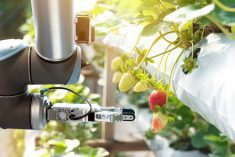One third of agricultural jobs could be automated in the next decade according to a recent report from the Conference Board of Canada.
“While these technologies [automation, data analytics, etc.] hold the potential to optimize production and enable data-driven decision-making,” the report said, “their adoption has led to increased demand for workers with higher levels of education and skills.”
According to the report, published at the end of July, adoption of precision technologies like GPS guidance, yield mapping and variable rate application has been growing steadily. This is most prominent on large-scale farms. Sixty-four per cent of farms with revenues over $1 million use some kind of precision technology.
Read Also

Alberta harvest wrapping up: report
Harvest operations advanced to 96 per cent complete in Alberta as of Oct. 7, with only a few late-seeded cereal and canola fields remaining, according to the latest provincial crop report.
The report said that, in light of agriculture’s persistent labour challenges and its aging workforce, businesses may increasingly turn to automation. However, it also called adoption of technology “lethargic.” It attributed this to the perception of insufficient return on investment, lack of government support, and lack of in-house expertise.
Technology adoption will increase the need for certain roles and decrease demand for others.
The report put the top five fastest-growing agricultural jobs as nursery and greenhouse labours, truck drivers, landscape and horticulture technicians, animal care workers, and biological technologists and technicians.
The top five fastest declining roles are agriculture managers, specialized livestock workers and farm machinery operators, livestock labourers, harvesting labourers, and accountants and bookkeepers.
Automation technology adoption in the agri-food workforce will require a more educated workforce.
“The skills most in demand for the future agriculture workforce are product design, digital production, and digital literacy,” the report said.
The Conference Board of Canada recommended investment in education programs to develop worker proficiency with “digital tools, product design, and complex problem-solving and emphasize soft skills such as adaptability.”
It also recommended promotion of the role of farming and food production in the economy, particularly the need for tech-savvy workers.

















